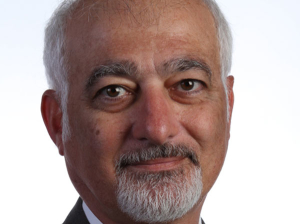
Hossein Jadvar, MD, PhD, MPH, MBA
A Keck School of Medicine researcher has been awarded grant funding to further his research into the detection and treatment of prostate cancer, which is among the most common types of cancer and the second leading cause of cancer death among U.S. men.
Hossein Jadvar, MD, PhD, MPH, MBA, associate professor of radiology and biomedical engineering, will receive an exploratory and developmental research grant with just under $450,000 in funding over a two-year period from the National Institutes of Health for his project, “Pilot Human Studies of FMAU PET in Prostate Cancer.” The proposal received a top score from the NIH review panel, which attests to its significance and the anticipated impact.
The prestigious grant funds new studies that break ground or extend previous discoveries in new directions and “high risk, high reward” studies that may lead to a breakthrough in a particular area, or result in novel techniques, methodologies, models or applications that will impact biomedical, behavioral or clinical research, according to the NIH.
The study will investigate the use of image-targeted biopsies through the implementation of position emission tomography radiotracers that monitor cellular proliferation to see if cancer can be found in the prostate gland even if past biopsies did not detect any cancer. A PET scan imaging test uses low-levels of radioactive material called radiotracer administered through an IV to scan organs and look for diseases.
“For patients who have had biopsies of the prostate gland and the urologist didn’t find anything, but their blood PSA level is elevated, the question becomes ‘What do you do next?’” Jadvar said. “I’ve found that in a patient that previously had a negative biopsy, this tracer might be able to find cancer.”
The study could lead to earlier detection of prostate cancer and more targeted, less-invasive treatment.
“Image-targeted biopsies are much better than what we do today and provide a way for more effective, image-targeted treatment,” Jadvar said. “This may allow the cancer to be treated without taking the entire gland out.”
The study is expected to begin by the end of the year and enroll about 40 patients.
Co-investigators include Osamu Ukimura, MD, PhD, Susan Groshen, PhD, Kai Chen, PhD, and Peter Conti, MD, PhD.
A native of Tehran, Iran, Jadvar has been active in contributing to the nuclear medicine and molecular imaging field throughout his career. He holds nine patents and serves on multiple NIH review panels.
Widely considered a leader in the field of nuclear medicine, Jadvar has been an attending physician at Keck Medical Center of USC and a member of the USC Norris Comprehensive Cancer Center since 1999.
by Douglas Morino